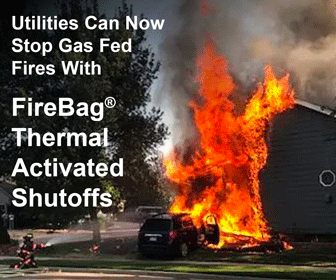Automatic Gas Thermal Activated Gas Shutoffs (TAS) Minimize Property Damage and Protect Lives
To prevent unrestricted release of gas during fires, many European countries require an automatic thermal gas shutoff valve on all natural gas-fed appliances. In the U.S., states such as Massachusetts require automatic thermal gas shutoff, but this is not uniformly required throughout the country.
To find out if U.S. fires would have been better contained with automatic thermal gas shutoffs, TECO Americas surveyed first responders in Texas, California and Pennsylvania to learn from their experiences.
One of the respondents, a Pennsylvanian fire fighter, recalled a fire that originated in a basement. Although the fire department arrived to the scene of the fire quickly, the fire fighters encountered difficulty in locating the basement door. This slight delay gave the fire extra seconds to burn before the gas was terminated at the curb. During this time, the fire burnt through a hot-water heater line and became gas-fed. When the basement door was finally found, a blue-ish flame was already coming up the stairs.
The time that the fire fighters lost while searching for the basement door was not much, but by enabling the fire to reach a gas source, the house suffered significantly more damage. Had a thermally activated gas shut-off device been installed, the outcome could have been very different.
“Examining fires such as this one reported from Pennsylvania helps us to understand the importance of thermal automatic shut-offs,” reports Wally Armstrong, a principal of the Liberty Group, a supplier to gas utilities. In their survey of first responders, TECO Americas received many similar reports. Departments in all three states reported incidents where fires were inflamed after reaching appliance gas lines.
Thermal Gas Shutoff Valve Installations on Kitchen Gas Appliances
According to the National Fire Protection Association (NFPA), U.S. fire departments face 2,110 home fires each year where natural gas is the first material ignited, and 1,170 home fires a year where LP-gas is involved with the start of a fire. Most home gas fires originate in the kitchen at the stove or gas range.

U.S. homeowners assume that they have the protection of automatic thermal gas shut-offs. When they learn that a simple and inexpensive automatic thermal gas shutoff is available, they are shocked to learn gas appliances are not required to have this protection, and feel they are exposed to unnecessary risk.
The National Fire Incident Reporting System (NFIRS) is a system established by the National Fire Data Center of the United States Fire Administration (USFA) to document and develop uniform data reporting when gathering and analyzing information on fires across the U.S. The NFIRS is the world’s largest national annual database of fire incident information, collecting information from over 11,000 fire departments throughout 49 states and the District of Columbia.
Massachusetts leads in the U.S. for safety regulations regarding automatic thermally active shut-off devices for natural gas, and recently approved the FireBag® for MA plumbers and gasfitters.
A full list of TECO America’s FireBag® Certifications includes:
- Massachusetts MA CMR 248 compliant
- DIN 3586 thermo activated safety device for gas applications (view PDF)
- European UNI EN 1775 Standard for indoor gas installations
- European Directive 90/396/CEE certification for durability in mechanical or thermal stress
- German DVGW TRGI 86/96 Standard for thermo activated locking systems on gas heaters, water heaters & domestic gas fittings
- German Standard Muster-Feuerverordnung (FeuVo v. 02/95 – edition 09/97) for thermo activated devices
- Italian UNI 7129 Ed 2001 Standard for fire protection and gas supply line components
Resources
Contact Us Today!
All information is confidential and sent directly to a TECO Americas representative.
TECO® Americas, LLC
263 Cox Street Roselle, NJ 07203
inquiry@tecoamericas.com
Phone: 908-488-0909
https://tecoamericas.com



